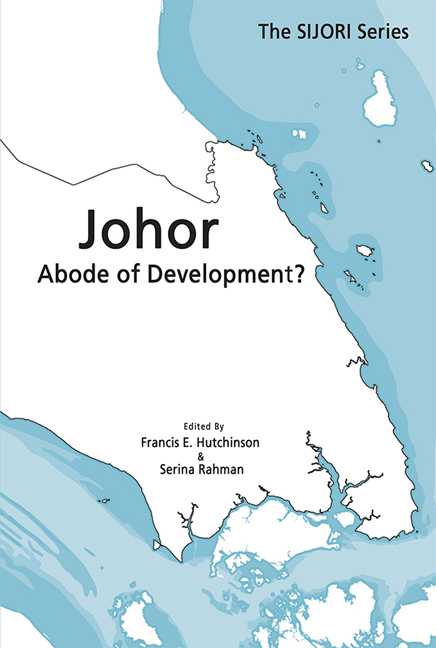Foreword
Published online by Cambridge University Press: 24 November 2020
Summary
In 2016, when ISEAS published the book, The SIJORI Cross-Border Region: Transnational Politics, Economics, and Culture, co-edited by Francis Hutchinson and Terence Chong, Malaysia was on the cusp of major political change. The ruling Barisan Nasional (BN) coalition secured a parliamentary majority in the 2013 general election, but lost the popular vote. This book, the second in a series of three, began in 2016 and took three years to complete, by which time the Pakatan Harapan (PH) coalition had ousted the incumbent to become the ruling party. Johor, Peninsular Malaysia's southernmost state, also fell to PH, which secured thirty-six out of fifty-six seats in the state parliament.
Johor enjoys a central place in the SIJORI region. Over the last two decades, it has seen significant political and economic developments. Its economic and social interactions with Singapore and proximity to the Riau Islands have contributed to its stellar growth. The state's population grew from 2.7 million in 1990 to 3.7 million in 2017. These factors facilitated Johor's industrialization drive as well as economic diversification, and altered its politics, society and environment. The establishment of Iskandar Malaysia in 2006 further accelerated these developments.
Today, the close economic and people-to-people relations between Johor and Singapore continue to flourish. Both are connected to each other by cross-border networks in sectors such as electrical and electronics, oil and gas, logistics, as well as agriculture. In Iskandar Malaysia, health and education services are new elements of this co-operation. In the near future, the proposed rapid transit system to link Johor and Singapore will further enhance interactions between them. The growing importance of their interactions saw Singapore establishing a consulate in Johor in November 2009.
Francis Hutchinson and Serina Rahman, the co-editors of this book, have assembled a team of twenty collaborators. Their collective work will contribute to a better understanding of the key transformations that have taken place in Johor since its embrace of export-oriented industrialization in 1990, and the different influences to which the state has been exposed as a result of its position within the Malaysian Federation and the SIJORI Cross-Border Region.
Information
- Type
- Chapter
- Information
- JohorAbode of Development?, pp. xviPublisher: ISEAS–Yusof Ishak InstitutePrint publication year: 2020
